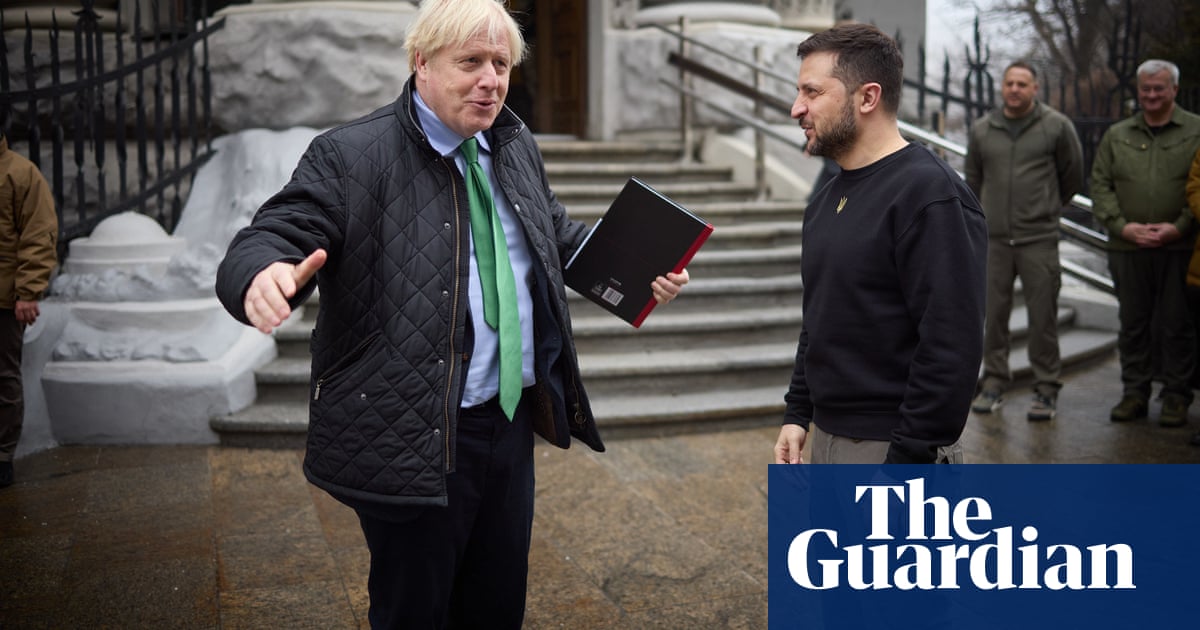Boris Johnson has issued stern criticism of Donald Trump’s Ukraine peace proposals in one of his first apparent censures of the US president, saying under his terms the Ukrainians would “get nothing”.
The former British prime minister, a strong supporter ofUkrainewho remains close to Ukraine’s president, Volodomyr Zelenskyy, has previously said there is “method in the madness” of Trump’s approach and that he believed the US president could bring peace.
But in a post on X, Johnson criticised the apparent terms of a deal that Trump is pushing Kyiv to accept.
Overnight, Trumpaccused Zelenskyyof jeopardising what he claimed was an imminent peace deal to end the war in Ukraine as he gave the clearest hint yet that the US would be willing to formally recognise Russia’s seizure of Crimea as part of any agreement.
Russia then carried out one of the mostdevastating air attacks against the capitalfor months, with Kharkiv and other cities also targeted.
“Putin indiscriminately butchers more Ukrainian civilians, killing and injuring 100 in Kyiv including children,” Johnson posted. “And what is his reward under the latest peace proposals?
“1. The right to keep sovereign Ukrainian territory he has taken by violence and in breach of international law. 2. The right to control Ukraine’s destiny by forbidding Nato membership. 3. The lifting of sanctions againstRussia. 4. An economic partnership with America. 5. The chance to rebuild his armed forces for the next attack in a few short years’ time.”
He added: “As for Ukraine – what do they get after three years of heroic resistance against a brutal and unprovoked invasion? What is their reward for the appalling sacrifices they have made – for the sake, as they have endlessly been told, of freedom and democracy around the world?
“Apart from the right to share their natural resources with the United States they get nothing. What is there in this deal that can realistically stop a third Russian invasion? Nothing. If we are to prevent more atrocities by Putin then we must have a long-term, credible and above all properly funded security guarantee for Ukraine – a guarantee issued by the UK, the US and all western allies.”
Keir Starmer condemned Moscow’s overnight strikes on Kyiv, saying it was “a real reminder that Russia is the aggressor here and that is being felt by the Ukrainians, as it has been felt for three long years now. That’s why it’s important to get Russia to an unconditional ceasefire.”
He added: “We’re making progress towards the ceasefire. It’s got to be a lasting ceasefire. But these attacks – these awful attacks – are a real, human reminder of who is the aggressor here and the cost to the Ukrainian people.”
Trumpalso criticised the strikesin a post on his Truth Social network. He said: “I am not happy with the Russian strikes on KYIV. Not necessary, and very bad timing. Vladimir, STOP! 5000 soldiers a week are dying. Lets get the Peace Deal DONE!”
Johnson has previously criticised some of Trump’s language about Zelenskyy, including during theirWhite House fallout, saying it was “ghastly to hear some of the language that’s been coming from Washington about who started the war and Zelenskyy being a dictator”.
But in the aftermath of the row, Johnson defended Trump again in acolumn for the Mail, saying the war of words “was not meant to happen” and that the US president did have a viable plan for peace.
